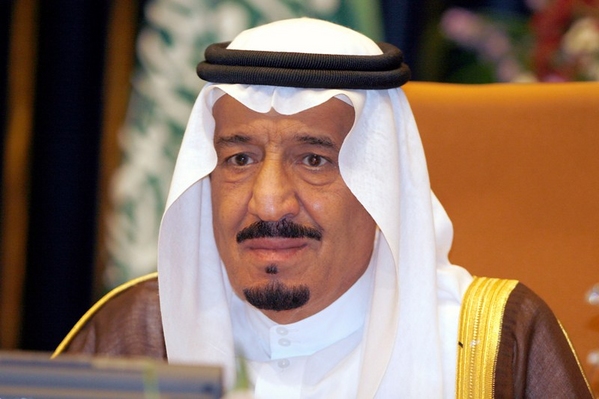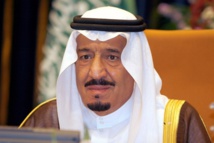Over the second half of last year the global price of crude oil dropped by about half, from above $100 a barrel.
Yet the kingdom in December announced a 2015 budget that included a slight rise in spending to $229.3 billion with a projected fall in revenue to $190.7 billion. Those numbers leave the country with its first budget deficit since 2011.
Saudi Arabia is the Arab world's largest economy, and much of its spending is on health, education and social services as well as infrastructure.
Officials have said the kingdom's reserves, estimated at $750 billion, enable it to withstand the global crude price drop.
Saudi Arabia is the world's biggest crude exporter and oil makes up about 90 percent of government revenue.
Salman told government officials and other dignitaries that the search for new deposits of oil, gas and other natural resources in Saudi Arabia would continue.
"High petrol prices during the past few years have had a positive effect on the economy of the kingdom, in the development of projects," the king said.
But the plunge in oil prices has emphasised the need for economic alternatives, and Salman said the kingdom's future economy "will be based on a number of foundations", with a growing number of small and medium enterprises.
"The next few years will be full of important accomplishments aimed at emphasising the role of the industry and the service sectors in the national economy."
- Continuity -
Salman delivered his wide-ranging palace address in front of Crown Prince Moqren, Deputy Crown Prince Mohammed bin Nayef, provincial governors, the top cleric Grand Mufti Sheikh Abdul Aziz al-Sheikh, other religious leaders, the Shura Council which advises the monarch, military officers and citizens.
"I have committed myself to continuing the work on the immutable foundations on which this blessed country has stood since its unification," he said, mentioning adherence to sharia Islamic law and preservation of unity and stability.
"We shall work continually towards the integrated, balanced and comprehensive development in all regions of the kingdom," added Salman, the latest in a line of ruling sons of King Abdul Aziz bin Saud, who founded Saudi Arabia in 1932.
The conservative Sunni-majority kingdom has a Shiite minority which has complained of marginalisation.
Salman urged officials to "be attuned to the citizens", and indicated that he wants the fight against corruption stepped up.
The kingdom's foreign policy "is based on the teachings of our religion that call for peace and kindness", Salman said, but "extremism and terrorism" will be fought at their roots in cooperation with others.
"Defence of Arab and Islamic causes, and in the first place the right of the Palestinians to a state with Jerusalem as its capital, will remain at the top of Saudi Arabia's demands," Salman said.
Analysts have expected the new king to maintain a steady course for the kingdom's oil and foreign policy after his half-brother king Abdullah died aged about 90.
In September, Saudi Arabia joined air strikes as part of a United States-led coalition of Western and Arab nations bombing the Islamic State group extremists who have seized swathes of Iraq and Syria.
---------------------------------------------------------------------------------------------------------
Yet the kingdom in December announced a 2015 budget that included a slight rise in spending to $229.3 billion with a projected fall in revenue to $190.7 billion. Those numbers leave the country with its first budget deficit since 2011.
Saudi Arabia is the Arab world's largest economy, and much of its spending is on health, education and social services as well as infrastructure.
Officials have said the kingdom's reserves, estimated at $750 billion, enable it to withstand the global crude price drop.
Saudi Arabia is the world's biggest crude exporter and oil makes up about 90 percent of government revenue.
Salman told government officials and other dignitaries that the search for new deposits of oil, gas and other natural resources in Saudi Arabia would continue.
"High petrol prices during the past few years have had a positive effect on the economy of the kingdom, in the development of projects," the king said.
But the plunge in oil prices has emphasised the need for economic alternatives, and Salman said the kingdom's future economy "will be based on a number of foundations", with a growing number of small and medium enterprises.
"The next few years will be full of important accomplishments aimed at emphasising the role of the industry and the service sectors in the national economy."
- Continuity -
Salman delivered his wide-ranging palace address in front of Crown Prince Moqren, Deputy Crown Prince Mohammed bin Nayef, provincial governors, the top cleric Grand Mufti Sheikh Abdul Aziz al-Sheikh, other religious leaders, the Shura Council which advises the monarch, military officers and citizens.
"I have committed myself to continuing the work on the immutable foundations on which this blessed country has stood since its unification," he said, mentioning adherence to sharia Islamic law and preservation of unity and stability.
"We shall work continually towards the integrated, balanced and comprehensive development in all regions of the kingdom," added Salman, the latest in a line of ruling sons of King Abdul Aziz bin Saud, who founded Saudi Arabia in 1932.
The conservative Sunni-majority kingdom has a Shiite minority which has complained of marginalisation.
Salman urged officials to "be attuned to the citizens", and indicated that he wants the fight against corruption stepped up.
The kingdom's foreign policy "is based on the teachings of our religion that call for peace and kindness", Salman said, but "extremism and terrorism" will be fought at their roots in cooperation with others.
"Defence of Arab and Islamic causes, and in the first place the right of the Palestinians to a state with Jerusalem as its capital, will remain at the top of Saudi Arabia's demands," Salman said.
Analysts have expected the new king to maintain a steady course for the kingdom's oil and foreign policy after his half-brother king Abdullah died aged about 90.
In September, Saudi Arabia joined air strikes as part of a United States-led coalition of Western and Arab nations bombing the Islamic State group extremists who have seized swathes of Iraq and Syria.
---------------------------------------------------------------------------------------------------------









 Home
Home Politics
Politics











